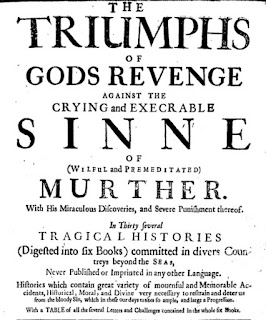What was Godfrey Goodman’s The Creatures Praysing God: or, The religion of dumbe creatures. An example and argument for the stirring up of our devotion and for the confusion of atheism, G. G. (1622)?
The ODNB life of the author, by Nicholas Cranfield, says that it was published as “an anonymous satire on the irreligion of his day”, which Goodman “used as a vehicle for dissemination of his sacramentalist understanding of the church.” This is probably the most sensible line one could take on a very odd little book. It’s not quite anonymous, being signed G.G. on the title page. The dedication to the reader (and I’m sure it’s Goodman himself writing) explains that “The Authour himselfe not vouchsafing his name, title, or preface to this his worke, and very unwilling that it should be published, I thought fit to let thee understand, that the booke it selfe containes no paradox, notwithstanding the title …” So the title we have read is not authorial, ‘G.G.’ is somehow fully anonymous, and it isn’t written as a prose paradox.
So, we are alerted to the chance that it might be a paradox, something to be read as not written sincerely.
The Creatures Praysing God might be bundled up with other early examples of failed irony (The Knight of the Burning Pestle; The Shortest Way with the Dissenters). The argument would go that Goodman means to incite more fervent devotion to God by shaming his Christian readers with an account of how pious the animals are. The animals he talks about (and they remain a very generalised concept, though he does mention a few species of birds) are like the citizens of Utopia, fictional beings designed to shame us into doing better.
The trouble is, though, that Goodman, like a 17th century Boris Johnson, gets drawn into an ardent advocacy of a point of view he doesn’t necessarily hold. Instead of establishing a satiric distance – ‘these are just animals: while this is how we humans behave’ – he gets drawn into making his case as though the general notion of animal piety has become both plausible and pleasing to him.
Here, he considers ‘The use of the creatures’:
“Thus as they were ordained for [man's] naturall use, for his food, clothing, labour: so it should seeme, they were appointed for his spirituall use, to serve him in the nature of Chaplaines, that they should honour and praise God, while their master, sinfull and wretched man, dishonours him, yet their service might seeme to be done by his appointment.”
The satire wavers into view: just as a wealthy man delegates piety to a chaplain, so animals can be imagined to taking up the slack on worship on behalf of us all. This is a step towards Douglas Adams’ ‘robot monk’. The necessary satiric outrage, though, doesn’t appear, for Goodman seems (to me at least) to be pleased by this fancy of mute worship because that’s actually how he’d like people to be. In theory, he’s all for active and intellectual faith, but his politics are very monarchical, and his faith was really drawn towards a borderline ceremonial-Catholic display of the divine mysteries to a trusting lay congregation. So his animals (however he pictures them, for he never specifies any particular quadruped) actually are his ideal believers.
Now, Goodman can’t have been unaware that creatures engaged in worship was a motif in earlier art in this country, and contemporary Catholic art abroad, especially in images of St Francis preaching to the birds. Therefore the thought that the animals might actually be crypto-catholics crosses his mind, and he hastens to assure us that animals are perfectly orthodox, if a little more reticent than good Church of England Protestants should be:
“Let us then enquire of the Creatures, whether they acknowledge one God, or will admit a plurality of gods in their service. And here upon the first view and appearance, they seeme unto me to cry and to testifie one God, one God, for all nature is directed to one end …the Creatures do testifie of God, which in effect is their faith; but I will passe this over: yet give me leave to passe my censure upon it … Upon due examination I finde them to be sound and Orthodoxall, I cannot taxe them with Atheisme or Heresie, but what they say or testifie of God, it is most true; onely with this defect, that they say not enough; nature cannot be raised above nature; the mysteries of grace fall not within the compasse of naturall bounds.”
Again, humour almost comes into view, but he can too readily think of human members of the church who are exactly like animals, and require things to be said for them:
“all of them [the animals] testifying the same truth, do in a sort make one common confession of their faith, they say their Creed together, as we do; this is enough, to save and excuse them from the imputation of infidelity: for children do no more in their baptisme, whom notwithstanding we know to be in the number of Gods faithfull people.”
His piety keeps taking off the satiric edge; he adores his dumb animals who can somehow say their creed.
The obvious next step was to decide whether these good but four-legged Anglican believers who happen to be animals will go to heaven. Rather surprisingly, he decides they will, if not necessarily in the same nature.
It was a very long debate, the one about whether animals had souls. One thinks of John Wesley playing his flute to the lions in the Tower of London, or Boswell trying to argue that “when we see a very sensible dog, we know not what to think” (and Dr Johnson’s howl of derision, which I recall as being along the lines of “and when we see a very silly fellow…”).
What Goodman says is this, in a vein of pious witticism:
“If this seeme a strange doctrine then, let this reason confirme it: Creatures were first created in Paradise. Then surely they were not so much ordained for slaughter, and mans use, as for the setting forth of Gods glory. Now since our fall, they groane and travell in paine together with us under the burthen of our sinnes, and our miseries, the punishments of sinne, Rom. 8.22. yet still they continue innocent in themselves, they are often imployed in Gods service, alwaies praysing God in their owne kinde, and never incurre the breach of his law, but are patient, notwithstanding our immoderate and inordinat abuse. Then surely by a course of justice, according to their manner, and the capacity of their owne nature, though not in themselves, (that is) in the fiercenesse, malignity and corruption of their nature, yet in their owne first elements and principles, or as they have now entred into mans body, and are become parts of mans flesh, all the Creatures in generall shall partake with us, in our future intended renovation.”
This is just a proof from "reason", not from faith (and he has the Bible text at Revelations 22: 15 directly against him regarding dogs). Maybe animals get into the Holy City as they were first created, or, as we have eaten some of them, our reincarnation will involve something of them being mixed up with us in heaven,
The purportedly satirical work sounds in places very much like neo-platonically influenced writing of the Vaughan / Thomas Traherne kind:
“Thus the stocks and the stones in their silence, and in their naturall properties; the beasts in their sounds and their cries, in their sence and in their motions, all serue to praise him: for God requires no more then he hath first giuen, the right imployment of his gifts is indeed to praise him.”
That reminds me of Vaughan’s assertion that even stones “are deep in contemplation” of God, and that ecstatic brushing aside of anything as petty as facts is like Traherne.
This odd work can perhaps be thought of as a kind of pendant to his earlier and better-known work, The fall of man, or the corruption of nature, proved by the light of our naturall reason, 1616, That work involved Goodman in a long contemplation of the fallen state of God's creation, and he has much to say about 'the creatures'. In fact, an incredible amount: he can't think about humankind without triangulating between the angels (sketchy data) and the animals (a point of reference on almost every page). In this earlier text, there's no fanciful imagining of the animals as worshiping God in some silent fashion. They are simply the lower creation, and the decayed state of humankind means that we are falling closer to them, and that they are in many ways better off than us. "It should seeme wee live upon the borders, betweene God and the creatures", reflects Goodman, in thinking about why mankind is more susceptible to illness than animals are. That's because God's plagues light first on us, as is just.
And suddenly, it bursts out of Goodman:
"I have often seene and observed in the streets, an ould blinde decrepit man full of sores, and inward griefe; hungry, naked, cold, comfortlesse & harbourlesse, without patience to sustaine his griefe, without any helpe to releive him, without any counsell to comfort him, without feare of Gods justice, without hope of Gods mercy, which as at all times, so most especially in such distresse should be the sole comfort of a christian man. I protest before God that were it not, for the hope of my happines, and that I did truly beleeue the miseries of this life, to be the just punishments of sinne, I should much prefer the condition of dumbe creatures, before the state of man."
The human condition he sees as wretched. This destitute old man is damned in both worlds, this and the next ("without hope of Gods mercy"). Doctrinally, Goodman accepts that there is justice in God's having it so, it is the punishment we deserve. But otherwise, he'd prefer to be an animal. This seems to me to go beyond mere rhetoric. Can you really accept such a punitive God as being just? Goodman suddenly sounds like Faustus:
O, no end is limited to damned souls!
Why wert thou not a creature wanting soul?
Or why is this immortal that thou hast?
Ah, Pythagoras' metempsychosis, were that true,
This soul should fly from me, and I be changed
Unto some brutish beast! all beasts are happy,
For, when they die,
Their souls are soon dissolved in elements;
But mine must live still to be plagued in hell.
Or like John Donne:
If lecherous goats, if serpents envious
Cannot be damned, alas, why should I be?

























